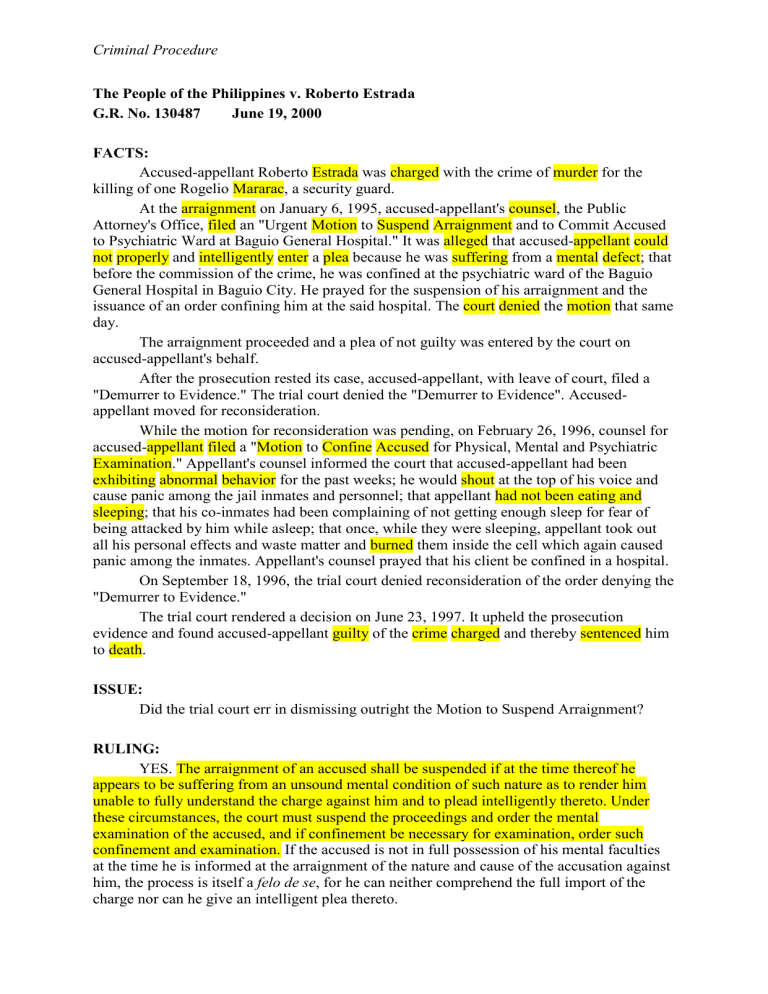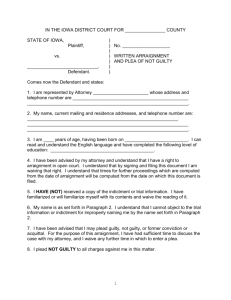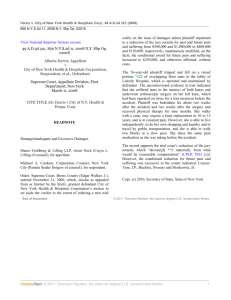Philippines v. Estrada: Criminal Procedure & Mental Competency
advertisement

Criminal Procedure The People of the Philippines v. Roberto Estrada G.R. No. 130487 June 19, 2000 FACTS: Accused-appellant Roberto Estrada was charged with the crime of murder for the killing of one Rogelio Mararac, a security guard. At the arraignment on January 6, 1995, accused-appellant's counsel, the Public Attorney's Office, filed an "Urgent Motion to Suspend Arraignment and to Commit Accused to Psychiatric Ward at Baguio General Hospital." It was alleged that accused-appellant could not properly and intelligently enter a plea because he was suffering from a mental defect; that before the commission of the crime, he was confined at the psychiatric ward of the Baguio General Hospital in Baguio City. He prayed for the suspension of his arraignment and the issuance of an order confining him at the said hospital. The court denied the motion that same day. The arraignment proceeded and a plea of not guilty was entered by the court on accused-appellant's behalf. After the prosecution rested its case, accused-appellant, with leave of court, filed a "Demurrer to Evidence." The trial court denied the "Demurrer to Evidence". Accusedappellant moved for reconsideration. While the motion for reconsideration was pending, on February 26, 1996, counsel for accused-appellant filed a "Motion to Confine Accused for Physical, Mental and Psychiatric Examination." Appellant's counsel informed the court that accused-appellant had been exhibiting abnormal behavior for the past weeks; he would shout at the top of his voice and cause panic among the jail inmates and personnel; that appellant had not been eating and sleeping; that his co-inmates had been complaining of not getting enough sleep for fear of being attacked by him while asleep; that once, while they were sleeping, appellant took out all his personal effects and waste matter and burned them inside the cell which again caused panic among the inmates. Appellant's counsel prayed that his client be confined in a hospital. On September 18, 1996, the trial court denied reconsideration of the order denying the "Demurrer to Evidence." The trial court rendered a decision on June 23, 1997. It upheld the prosecution evidence and found accused-appellant guilty of the crime charged and thereby sentenced him to death. ISSUE: Did the trial court err in dismissing outright the Motion to Suspend Arraignment? RULING: YES. The arraignment of an accused shall be suspended if at the time thereof he appears to be suffering from an unsound mental condition of such nature as to render him unable to fully understand the charge against him and to plead intelligently thereto. Under these circumstances, the court must suspend the proceedings and order the mental examination of the accused, and if confinement be necessary for examination, order such confinement and examination. If the accused is not in full possession of his mental faculties at the time he is informed at the arraignment of the nature and cause of the accusation against him, the process is itself a felo de se, for he can neither comprehend the full import of the charge nor can he give an intelligent plea thereto. Criminal Procedure The question of suspending the arraignment lies within the discretion of the trial court. And the test to determine whether the proceedings will be suspended depends on the question of whether the accused, even with the assistance of counsel, would have a fair trial. In the American jurisdiction, the issue of the accused's "present insanity" or insanity at the time of the court proceedings is separate and distinct from his criminal responsibility at the time of commission of the act. The defense of insanity in a criminal trial concerns the defendant's mental condition at the time of the crime's commission. "Present insanity" is commonly referred to as "competency to stand trial" and relates to the appropriateness of conducting the criminal proceeding in light of the defendant's present inability to participate meaningfully and effectively. In competency cases, the accused may have been sane or insane during the commission of the offense which relates to a determination of his guilt. However, if he is found incompetent to stand trial, the trial is simply postponed until such time as he may be found competent. Incompetency to stand trial is not a defense; it merely postpones the trial. In determining a defendant's competency to stand trial, the test is whether he has the capacity to comprehend his position, understand the nature and object of the proceedings against him, to conduct his defense in a rational manner, and to cooperate, communicate with, and assist his counsel to the end that any available defense may be interposed. There are two distinct matters to be determined under this test: (1) whether the defendant is sufficiently coherent to provide his counsel with information necessary or relevant to constructing a defense; and (2) whether he is able to comprehend the significance of the trial and his relation to it. The first requisite is the relation between the defendant and his counsel such that the defendant must be able to confer coherently with his counsel. The second is the relation of the defendant vis-a-vis the court proceedings, i.e., that he must have a rational as well as a factual understanding of the proceedings. The determination of whether a sanity investigation or hearing should be ordered rests generally in the discretion of the trial court. Mere allegation of insanity is insufficient. There must be evidence or circumstances that raise a "reasonable doubt" or a "bona fide doubt" as to defendant's competence to stand trial. Among the factors a judge may consider is evidence of the defendant's irrational behavior, history of mental illness or behavioral abnormalities, previous confinement for mental disturbance, demeanor of the defendant, and psychiatric or even lay testimony bearing on the issue of competency in a particular case. In the case at bar, the trial court denied the motion after finding that the questions propounded on appellant were intelligently answered by him. The fact that accused-appellant was able to answer the questions asked by the trial court is not conclusive evidence that he was competent enough to stand trial and assist in his defense. Section 12, Rule 116 speaks of an unsound mental condition that "effectively renders [the accused] unable to fully understand the charge against him and to plead intelligently thereto." It is not clear whether accused-appellant was of such sound mind as to fully understand the charge against him. It is also not certain whether his plea was made intelligently. The plea of "not guilty" was not made by accused-appellant but by the trial court "because of his refusal to plead." The trial court took it solely upon itself to determine the sanity of accused-appellant. The trial judge is not a psychiatrist or psychologist or some other expert equipped with the specialized knowledge of determining the state of a person's mental health. To determine the accused-appellants competency to stand trial, the court, in the instant case, should have at least ordered the examination of accused-appellant, especially in the light of the latter's history of mental illness.

